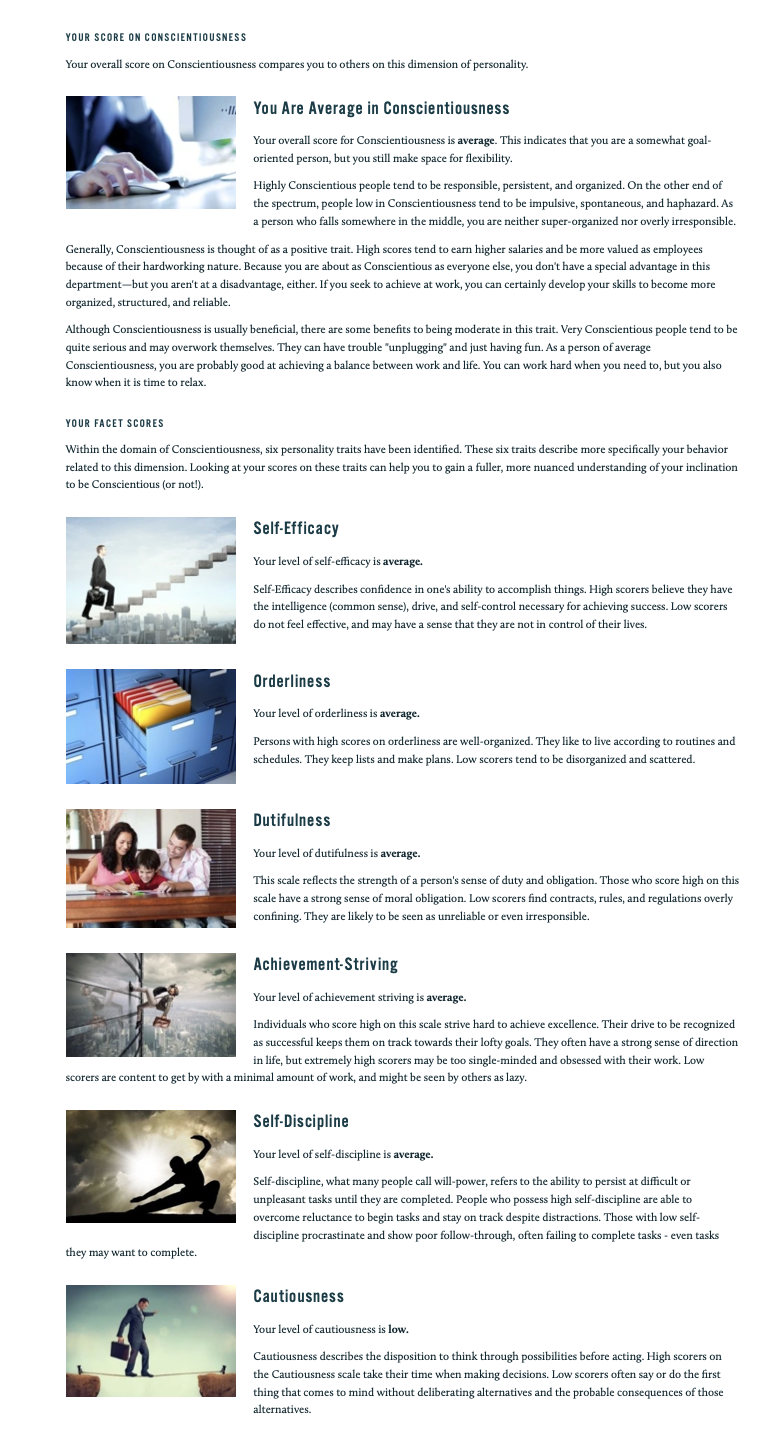Answered step by step
Verified Expert Solution
Question
1 Approved Answer
Answer the question about the Conscientiousness Assessment 1. What is the title of the assessment (and source/website if available) 2. What is the purpose of

Answer the question about the Conscientiousness Assessment
1. What is the title of the assessment (and source/website if available)
2. What is the purpose of the assessment?
3. What are the results?
4. What did learn from the results?
5. Why is it helpful to know this as a leader?
6. What steps can take to apply this new knowledge to leadership development?
Your overall score on Conscientiousness compares you to others on this dimension of personality. You Are Average in Conscientiousness Your overall score for Conscientiousness is average. This indicates that you are a somewhat goaloriented person, but you still make space for flexibility. Highly Conscientious people tend to be responsible, persistent, and organized. On the other end of the spectrum, people low in Conscientiousness tend to be impulsive, spontaneous, and haphazard. As a person who falls somewhere in the middle, you are neither super-organized nor overly irresponsible. Generally, Conscientiousness is thought of as a positive trait. High scores tend to earn higher salaries and be more valued as employees because of their hardworking nature. Because you are about as Conscientious as everyone else, you don't have a special advantage in this department-but you aren't at a disadvantage, either. If you seek to achieve at work, you can certainly develop your skills to become more organized, structured, and reliable. Although Conscientiousness is usually beneficial, there are some benefits to being moderate in this trait. Very Conscientious people tend to be quite serious and may overwork themselves. They can have trouble "unplugging" and just having fun. As a person of average Conscientiousness, you are probably good at achieving a balance between work and life. You can work hard when you need to, but you also know when it is time to relax. YOUR FACET SCORES Within the domain of Conscientiousness, six personality traits have been identified. These six traits describe more specifically your behavior related to this dimension. Looking at your scores on these traits can help you to gain a fuller, more nuanced understanding of your inclination to be Conscientious (or not!). Self-Efficacy Your level of self-efficacy is average. Self-Efficacy describes confidence in one's ability to accomplish things. High scorers believe they have the intelligence (common sense), drive, and self-control necessary for achieving success. Low scorers do not feel effective, and may have a sense that they are not in control of their lives. Orderliness Your level of orderliness is average. Persons with high scores on orderliness are well-organized. They like to live according to routines and schedules. They keep lists and make plans. Low scorers tend to be disorganized and scattered. Dutifulness Your level of dutifulness is average. This scale reflects the strength of a person's sense of duty and obligation. Those who score high on this scale have a strong sense of moral obligation. Low scorers find contracts, rules, and regulations overly confining. They are likely to be seen as unreliable or even irresponsible. Achievement-Striving Your level of achievement striving is average. Individuals who score high on this scale strive hard to achieve excellence. Their drive to be recognized as successful keeps them on track towards their lofty goals. They often have a strong sense of direction in life, but extremely high scorers may be too single-minded and obsessed with their work. Low scorers are content to get by with a minimal amount of work, and might be seen by others as lazy. Self-Discipline Your level of self-discipline is average. Self-discipline, what many people call will-power, refers to the ability to persist at difficult or unpleasant tasks until they are completed. People who possess high self-discipline are able to overcome reluctance to begin tasks and stay on track despite distractions. Those with low selfdiscipline procrastinate and show poor follow-through, often failing to complete tasks - even tasks they may want to complete. Cautiousness Your level of cautiousness is low. Cautiousness describes the disposition to think through possibilities before acting. High scorers on the Cautiousness scale take their time when making decisions. Low scorers often say or do the first thing that comes to mind without deliberating alternatives and the probable consequences of those alternativesStep by Step Solution
There are 3 Steps involved in it
Step: 1

Get Instant Access to Expert-Tailored Solutions
See step-by-step solutions with expert insights and AI powered tools for academic success
Step: 2

Step: 3

Ace Your Homework with AI
Get the answers you need in no time with our AI-driven, step-by-step assistance
Get Started


